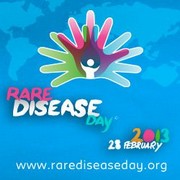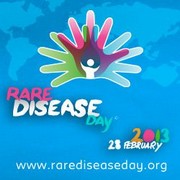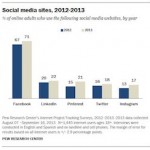 Several years ago a member of my family was diagnosed with a rare disorder. After numerous doctor visits and a multitude of tests, we finally received a diagnosis and were able to schedule surgery to address the condition. Among rare disease patients, my family was lucky.
Several years ago a member of my family was diagnosed with a rare disorder. After numerous doctor visits and a multitude of tests, we finally received a diagnosis and were able to schedule surgery to address the condition. Among rare disease patients, my family was lucky.
 Several years ago a member of my family was diagnosed with a rare disorder. After numerous doctor visits and a multitude of tests, we finally received a diagnosis and were able to schedule surgery to address the condition. Among rare disease patients, my family was lucky. A diagnosis was made relatively quickly and a treatment was available. For many rare disease patients and their families, finding a diagnosis can take years, not months, and few treatments, if any, are available.
Several years ago a member of my family was diagnosed with a rare disorder. After numerous doctor visits and a multitude of tests, we finally received a diagnosis and were able to schedule surgery to address the condition. Among rare disease patients, my family was lucky. A diagnosis was made relatively quickly and a treatment was available. For many rare disease patients and their families, finding a diagnosis can take years, not months, and few treatments, if any, are available.
Looking back on my experience, I’ve often wondered how social media tools might have hastened the diagnosis and improved access to treatment for my family. In fact, today, we are seeing social media transform care for rare disease patients in several ways.
Facilitating Diagnosis
Though the symptoms of my family member were textbook for a particular rare disorder, our primary care physician never made the connection because he had never seen this condition in his decades of practice. But what if our primary care provider could have shared the details of the case with a large network of physicians, from a wide range of specialties? Would someone have recognized the condition because of professional experience or specialized expertise, helping us find the appropriate specialist more quickly?
Closed social networks such as Sermo and Doximity have helped some physicians crowdsource a diagnosis for difficult cases. Because they are open only to physicians, these social networks can overcome some of the privacy concerns that arise in an open social network. The limited access also ensures greater credibility.
Nonetheless, open social communities, which allow anyone to weigh in, may also be useful in facilitating a diagnosis. For example, a recent article in Wired magazine describes the case of a mother whose child was accurately diagnosed with a rare genetic disorder by her Facebook network.
Though information sharing on all social networks has potential to hasten diagnosis, patient privacy issues continue to be an important concern.
Connecting Patients with Treatment, Support, Resources
The pharmaceutical industry has become increasingly interested in developing drugs to treat rare diseases, thanks in part to incentives created by the Orphan Drug Act passed thirty years ago. The incentives extended to firms by the Orphan Drug Act include expedited approval, tax benefits and seven years of market exclusivity. In 2012, the FDA approved 39 products and approximately one-third of those approvals were orphan drugs.
After an orphan drug is approved, the pharmaceutical industry faces a challenge in communicating to patients and physicians about the drug. Using traditional communication channels, such as mainstream media or personal sales calls, is not practical or efficient as patients and specialists are few in number and widely dispersed.
However, the long tail qualities of the internet make it an ideal way for pharmaceutical firms to precisely target communications to rare disease patients and specialists. The National Organization of Rare Disorders (NORD) has links to 180 patient organizations, many of whom have active social communities on a variety of social platforms.
One example of how a firm has leveraged social communities to reach patients is NPS Pharmaceuticals, which has recently received approval for its drug for short bowel syndrome. NPS is working with a patient advocate to help connect with potential patients via his social network of 1,000 patients and caregivers.
Collaborating in Development and Funding of New Treatments
Though there is increased interest in developing treatments for rare diseases within the pharmaceutical industry, only 200 orphan drugs enter development each year according to the FDA. Yet there are nearly 7000 rare diseases. Thus, support and funding for many rare diseases may require more than just the support of the pharmaceutical industry. Crowdfunding may offer an option for additional financing of rare disease research.
According to Mashable, crowdfunding, “describes the collective effort of individuals who network and pool their resources, usually via the Internet, to support efforts initiated by other people or organizations.” A recent story on National Public Radio, explored how crowdfunding has been successfully used to raise money for a wide range of scientific research. Now, the nonprofit organization, Rare Genomics Institute is using crowdfunding to gather genetic information from rare disease patients that will help lead to the development of new therapies.
Others are using crowdfunding to promote greater awareness and interest in individual rare diseases. For example, filmmaker Joey Howell used the crowdfunding platform kickstarter to raise over $30,000 to produce a documentary about the rare degenerative disease MPS II, a lysosomal disorder.
While therapies for many rare diseases have yet to be discovered, new tools for sharing information, such as social media, provide new hope for rare disease patients and their families. To learn more about rare diseases and how you can get involved visit these organizations:
- National Organization for Rare Disorders (NORD)
- Office of Rare Diseases Research (ORDR), National Institutes of Health
- Rare Disease Day USA, February 28, 2013








